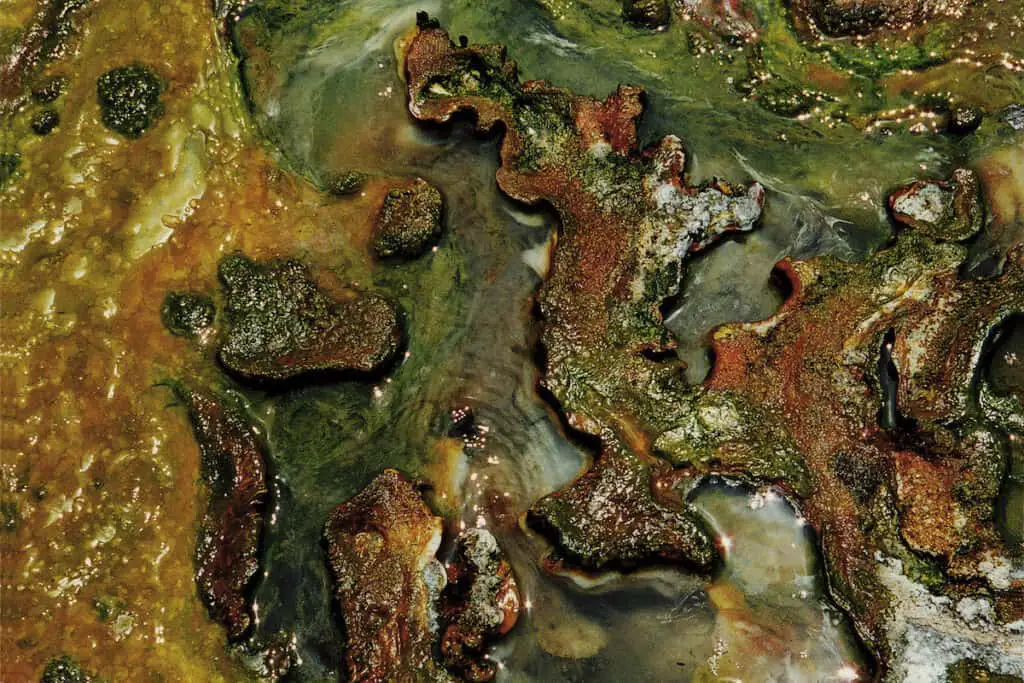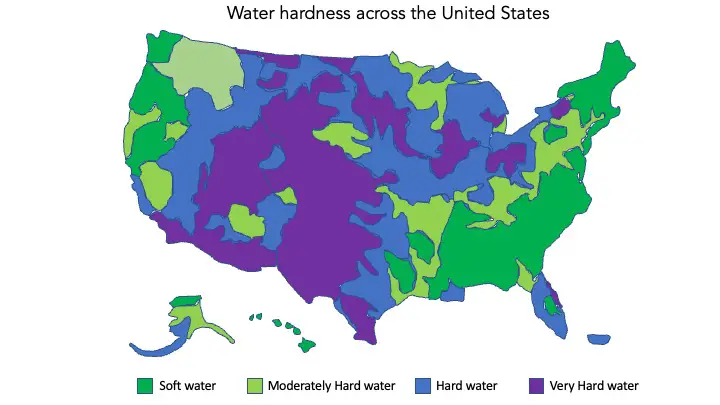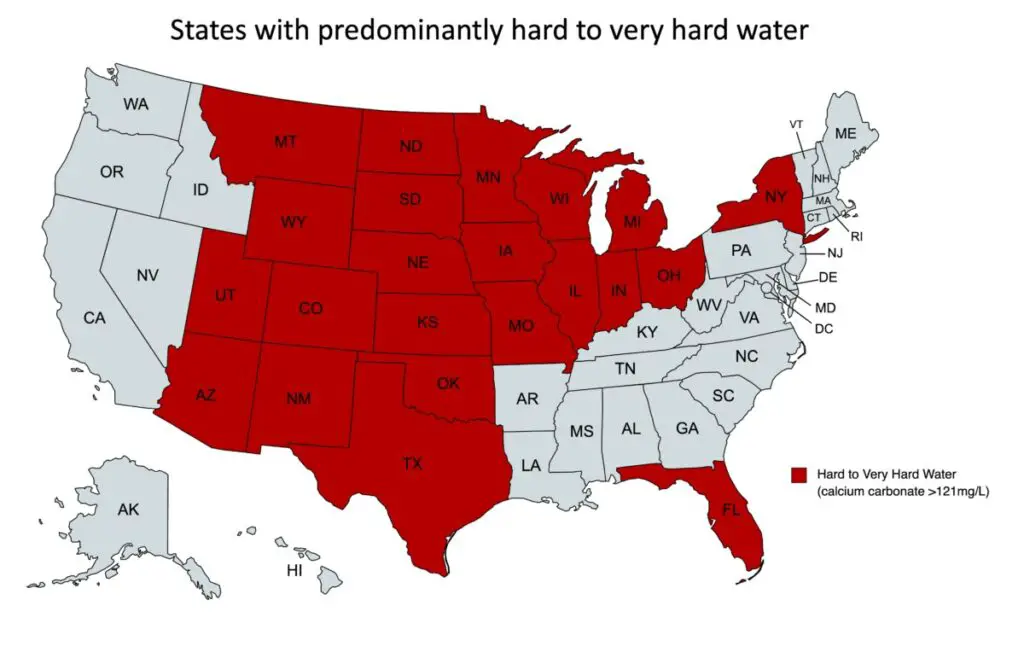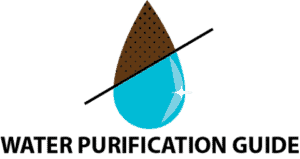Pure water should be tasteless, odorless, and colorless. Soapy tasting water is usually harmless, but there are a few times it may pose a health risk to you and your family, so it’s important to understand why your water has begun to taste like soap.
Water can taste like soap because of natural hardness, mineral or organic contamination, faulty plumbing issues or chlorine residue. A build-up of soap residue or an individual’s variation in sensitivity to taste can also make water taste soapy.
In this article, we explain each of the different reasons why your water is tasting like soap. We give you easy to follow instructions on how you can diagnose your particular problem and solve it.
Reasons why your water tastes like soap
1. Organic Contaminants

Organic contaminants are not the most common cause of soapy tasting water, but they are the most concerning.
The most concerning organic pollutant is septic contamination, which can lead to organic material as well as flushed-off soap/detergents mixing with your water. This can cause it to taste different, which many people interpret as soapy.
Other organic contaminants include algae and bacteria. The products from their bodily functions (like metabolism) can mix into the water supply can give it unusual flavors, including the distinct taste of soap.
Diagnosis and Solution
- Check the taste of water across all faucets in your home. It’s best to have multiple people taste it to rule out individual variation. Also check the color and smell – anything out of the ordinary is suspicious.
- If the water from all of the taps taste strange, the problem could be in the main water supply. Consider asking your neighbors as well to identify if the contamination is across your neighborhood, and not just your home. This also applies to those of you using a domestic well, as the contaminants can be in the groundwater that all of the wells in your area access.
- Contact your local authorities, who will then run a battery of laboratory tests to determine any possible contaminants.
- In the meantime, you can consider using home kits to analyze your water (these are easily available from Amazon, or from a lab like mytapscore.com)
Depending on your contaminants you will either need to flush out your system, wait a period of time or install a water filter.
If the contamination is short-lived (for example from a spill), then flushing your system or waiting a few days may be enough for the taste of soap to disappear.
Otherwise you will probably need to consider installing a water filter to improve the taste of your water, and remove any potentially harmful contaminants.
But make sure you check in with your local authorities so they can identify the source of contamination and treat it accordingly. This may also solve the problem, and prevent you from having to invest in a home filtration solution.
2. Hard Water (Mineral Contamination)
Calcium, magnesium and fluorides can make water taste soapy taste.
This will be the case if your water is naturally hard (which is most of the groundwater across the U.S.) For example, if your water comes from groundwater sources (wells, natural springs), it will contain a higher concentration of these minerals. Hard water also tends to taste more like soap when you heat it.
You can check out the maps below to know if the water in your area is hard


Sometimes, there minerals (especially fluoride) may be artificially added. Although not harmful at regular concentrations, it can easily be a cause for concern at higher concentrations, leading to a condition called fluorosis.
Diagnosis and Solution
- The hardness of your water can easily be tested with a home kit.
- If the hardness is high, consider installing a water softener to reduce mineral concentrations.
- If you notice the taste mostly in hot water, flushing the water heater can help remove accumulated mineral deposits inside the cylinder. Follow the manufacturer’s instructions for a thorough flushing process.
However, it’s important to know that moderately hard to hard water is perfectly safe to drink, it just tastes funny. So installing a water softener is personal choice.
Another option is a water filter that is capable of removing minerals – read more about those here.
3. Issues with Plumbing

If your plumbing system is old or faulty, it can make the water taste soapy in three ways:
- Old or deteriorating pipes can leach materials into the water, resulting in an off-putting taste. Some interpret it as soapy.
- If soap or detergent residues are in the plumbing system, they can mix with the water, causing it to taste soapy.
- If there are leaks in the piping, other contaminants (mineral or organic) can seep into your water and give it a soapy taste.
Diagnosis and Solution
- One thing you can do is have a professional/plumber come and inspect your piping system. Depending on level of the problem, it may be necessary to replace parts or all of your plumbing.
- You can also use home-test kits to check for organic or mineral contaminants in your water. If these contaminants are not present, it is unlikely that the soapy water is from leached minerals.
4. Chlorine from Water Treatment
Your local municipal water treatment plants uses certain substances like chlorine or chloramine to clean your water. This is an important process, as it removes nasty germs from your water making it safe to drink.
But chlorine has an unpleasant chemical or ‘soapy’ taste.
Diagnosis and Solution
Easy at-home testing kits are available that can tell you whether the water in your home contains chlorine. Many of these test kits are also designed to look for minerals and other contaminants that could be making your water taste soapy.
Reverse osmosis systems and activated charcoal based water filters are usually great at removing soapy odor and taste from water.
There is a large variety of water filter pitchers that use activated carbon to remove chlorine from water – you can check them out here.
5. Individual variation in taste sensitivity

Taste is a subjective sensation. Different people have different sensitivity to taste, and certain health conditions and medications can also change the way water and food tastes.
For example, people who are pregnant or on certain antibiotics/hormonal pills may sometimes notice a soapy taste in the water. Even conditions where smell is affected (like common cold) may sometimes alter the taste of your food and drinks.
Diagnosis and Solution
A simple way to diagnose this issue is by having other people taste the water. If nobody else can notice the taste, it’s possible that there’s nothing wrong with the water. It could also mean that you may have underlying health issues.
That being said, we still do recommend ruling out other causes of soapy taste in your water.
6. Variation with Temperature
Water can also taste more like soap at certain temperatures. Determining whether the soapy taste is more noticeable in hot or cold water can help you determine the root cause of the problem.
In general, if there are mineral contaminants in your water, they may become more soluble as the temperature of the water increases. This can increase their taste, making the water taste more soap-like.
This could also be the case where the problem is with the plumbing, as hot water leaches away minerals more than cold water does.
If the water tastes soapy even when cold, it’s likely because of organic contaminants, hard water minerals or chlorine.
Most of these can be detected using at-home test kits. To make sure your water remains taste and odor free, you’ll need to perform regular maintenance, water testing, and consulting with professionals when necessary.
